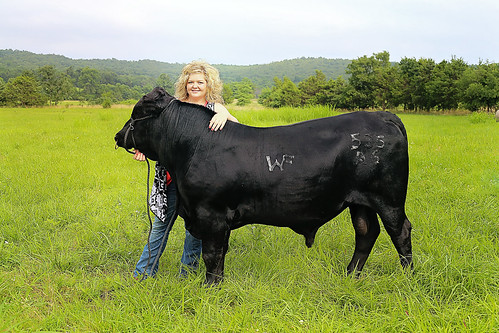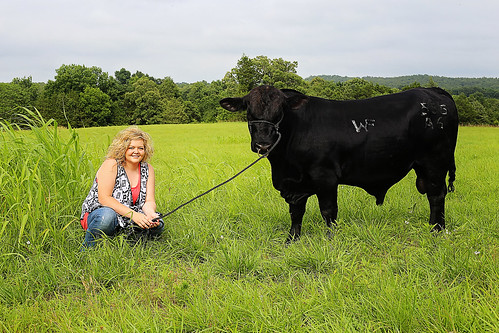
Dakota Williams said raising cattle is her career. At age 18, she already has plenty of experience and within the next 10 years she hopes to own her own farm. Photo by Kim Whitten Photography.
At age 18, Dakota Williams knows exactly what she wants to do with her life — own a farm and raise cattle.
“[Farming] is all I’ve ever known. I’m a third generation farmer, working the same land as my grandparents and I don’t want to see it end,” said Dakota. A member of the Cherokee tribe, Dakota said her ancestors lived off the land and she wants to honor them in her work. “Not many people can say they live in an area where their ancestors came from and they are still trying to make that land better.”
Under the Obama Administration, the U.S. Department of Agriculture has worked to improve housing, better educational opportunities, improve infrastructure and create employment and business opportunities for Native American families, including veterans and youth.
Dakota began her cattle business on her family’s Arkansas farm at age 12 with a Farm Service Agency (FSA) Youth Loan. Today, one month after graduating from high school, Dakota is taking that business and expanding it with an FSA Microloan to meet demand for a specialty mix breed of cow.
But this isn’t a regular microloan. For FSA, it’s the 13,000th microloan issued since the program was implemented in 2013.
“This is an outstanding accomplishment and shows how USDA is working to meet the needs of small, beginning and non-traditional farm operations,” said FSA Administrator Val Dolcini. “We’re helping Dakota build her own version of the American dream. She went from a youth loan to a microloan and will soon be able to graduate to commercial lending and meet the goal of owning her own farm.”
The microloan program allows beginning, small and mid-sized farmers along with non-traditional farm operations to access up to $50,000 in loans using a simplified application process. Participation in the popular program has increased 58 percent since last year, with already 5,000 microloans issued this year alone, at a $24,000 average. About 70 percent of microloans are issued to beginning farmers and 55 percent to first-time FSA borrowers.
For Dakota, that equates to purchasing more Angus cows to breed with Brangus bulls to create an Ultrablack breed. “It’s a growing breed and what more people are wanting,” said Dakota, whose talent for showing and high quality of standards has made her stand out among her peers.
In 2013, she was inducted into the Arkansas Purple Circle, a prestigious club that recognizes junior livestock exhibitors who have earned multiple championship honors at the Arkansas State Fair. She also won the Bill Nix Best of the Best Showmanship in 2013, the International Junior Brangus Breeders Association Reserve Grand Champion Cow/Calf pair in 2014 and was named the Junior Brangus Breeders Association Queen for 2013-14 and 2015-16.
Dakota will carry her long list of awards and accomplishments to college in the fall where she will focus on agriculture business.
“She is a good leader and a good role model for others,” said Willetta Everett, farm loan officer with the Sharp County Farm Service Agency. Everett has worked with Dakota to get a youth loan and the microloan. “Youth loans are really good and teach young students responsibility and work ethics and get them interested in agriculture, so when they graduate into the adult world they carry those traits with them.” FSA youth loans allow for establishing and operating income-producing projects in connection with their participation in 4-H Clubs, FFA and similar organizations. The project must be planned and operated with the help of the organization adviser and produce sufficient income to repay the loan.
While in college, Dakota said she plans to keep pushing her business by working early mornings and late nights, much like she did in high school.
“You have to be dedicated and know what you are getting into,” said Dakota. “If you don’t want to put in the time, then it’s not worth it in the end.”
For more information, visit www.fsa.usda.gov/microloans, www.fsa.usda.gov/youth-loans, www.usda.gov/tribalrelations or visit an FSA county office near you. To find your local FSA county office, visit http://offices.usda.gov.

Dakota Williams with her cattle. Photo by Kim Whitten Photography.
No comments:
Post a Comment